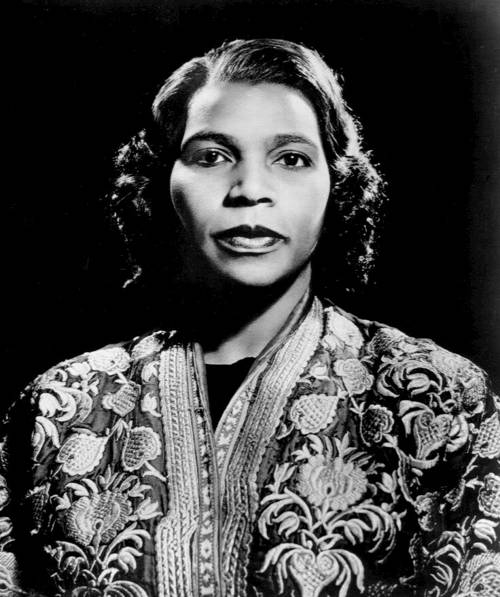
FAQ About Marian Anderson

Who was Marian Anderson?
Marian Anderson was an American contralto and one of the most celebrated singers of the 20th century. Born on February 27, 1897, in Philadelphia, Pennsylvania, she became an iconic figure not only for her exceptional vocal talent but also for breaking racial barriers in classical music and opera. Her career spanned several decades, during which she performed in major concert venues and with renowned orchestras around the world.

What was Marian Anderson famous for?
Marian Anderson was famous for her powerful voice and her role in breaking racial barriers in the music industry. She is perhaps best known for her historic concert on April 9, 1939, on the steps of the Lincoln Memorial, which drew a crowd of over 75,000 people. This performance was a response to the denial of her right to perform at Constitution Hall by the Daughters of the American Revolution due to her race. It became a significant moment in the civil rights movement.

How did Marian Anderson contribute to the civil rights movement?
Marian Anderson contributed to the civil rights movement by using her platform as a respected artist to challenge racial segregation. Her 1939 performance at the Lincoln Memorial, organized after she was denied entry to Constitution Hall, was a powerful protest against racial discrimination. Throughout her career, she also participated in numerous events advocating for racial equality and inspired future generations of African American artists.

When did Marian Anderson make her debut at the Metropolitan Opera?
Marian Anderson made her debut at the Metropolitan Opera on January 7, 1955. She became the first African American to perform with the company in a leading role, portraying the character Ulrica in Giuseppe Verdi's opera "Un ballo in maschera." This milestone event was not only a personal triumph for Anderson but also a significant step forward for racial integration in classical music.

What was the significance of Marian Anderson's performance at the Lincoln Memorial?
The significance of Marian Anderson's performance at the Lincoln Memorial lies in its symbolic protest against racial discrimination. Her performance, attended by 75,000 people and broadcast to millions more, highlighted the racial injustices of the time and was a precursor to the civil rights movement. The event is remembered as a pivotal moment in the struggle for racial equality in America.

Where and when was Marian Anderson born?
Marian Anderson was born on February 27, 1897, in Philadelphia, Pennsylvania. She grew up in a supportive environment that nurtured her musical talents from an early age, setting the stage for her future success as a performer.

How did Marian Anderson become involved in music?
Marian Anderson became involved in music through her involvement with her church choir at a young age. Recognized for her talent, her church community supported her early musical education. Anderson further honed her skills with formal training and began winning awards and gaining recognition in music contests, leading to her professional career in music.

What obstacles did Marian Anderson face in her career?
Marian Anderson faced numerous obstacles in her career, primarily due to racial prejudice. While her talent was recognized globally, she frequently encountered racial discrimination in the United States, including being denied performance venues and accommodations. Her 1939 Lincoln Memorial concert was a direct response to her being barred from performing at Constitution Hall due to her race.

What awards and honors did Marian Anderson receive?
Marian Anderson received many awards and honors throughout her career, recognizing both her musical talent and her contributions to the civil rights movement. Some notable accolades include the Presidential Medal of Freedom, awarded in 1963, the Congressional Gold Medal in 1977, and a Grammy Lifetime Achievement Award in 1991. These awards reflect her impact on music and society.

What was Marian Anderson's impact on aspiring African American musicians?
Marian Anderson's success and resilience served as an inspirational beacon for aspiring African American musicians. By breaking racial barriers in classical music, she paved the way for other African American artists to pursue careers in fields that had traditionally been closed to them due to segregation and discrimination. Her legacy continues to inspire musicians and civil rights activists alike.

Did Marian Anderson have any formal musical training?
Yes, Marian Anderson had formal musical training. She received vocal training from several prominent teachers, including Giuseppe Boghetti, who helped to refine her talent and technique. Despite the racial barriers she faced, Anderson's formal training played a significant role in her development as a world-class contralto.

What was the significance of Anderson's debut at the Metropolitan Opera?
Marian Anderson's debut at the Metropolitan Opera was significant as it marked the first time an African American performed in a leading role at the historic opera house. Her participation in "Un ballo in maschera" in 1955 shattered long-standing racial barriers in the operatic world and represented a major step towards racial equality in the arts.

How did Marian Anderson's early life influence her musical career?
Marian Anderson's early life in a church community that appreciated music greatly influenced her musical career. Her involvement in the Union Baptist Church choir in Philadelphia exposed her to music and performance from a young age. Encouraged by her family and community, she pursued music seriously, building a foundation that would support her later successes.

What was Marian Anderson's vocal range?
Marian Anderson was a contralto, which is the lowest female vocal range. Her voice was known for its rich tone, powerful presence, and extraordinary depth, qualities that captivated audiences worldwide. Anderson's range and technique allowed her to perform a diverse repertoire, from opera arias to spirituals.

How did Anderson's Lincoln Memorial concert come about?
The Lincoln Memorial concert on April 9, 1939, came about after the Daughters of the American Revolution (DAR) denied Marian Anderson permission to sing at Constitution Hall because of her race. In response, First Lady Eleanor Roosevelt and other influential figures arranged for Anderson to perform at the Lincoln Memorial, turning the event into a powerful statement against racial discrimination.

What legacy did Marian Anderson leave behind?
Marian Anderson left behind a legacy of breaking social, racial, and musical barriers. Her career inspired generations of musicians and civil rights activists, advocating for equal opportunities regardless of race. She demonstrated that talent and perseverance could effect change, leaving an indelible mark on American culture and history.

Did Marian Anderson face racial discrimination abroad?
While Marian Anderson encountered racial discrimination primarily within the United States, she did generally experience more favorable acceptance abroad. Europe in particular provided opportunities that were limited or unavailable to her at home, allowing her to perform in major concert halls and festivals. Still, racial prejudice was a global issue, and she remained a vocal advocate for equality everywhere she performed.

What were some of the famous venues where Marian Anderson performed?
Marian Anderson performed at many famous venues, including the Lincoln Memorial, Carnegie Hall, and the Metropolitan Opera. Her performance at the Lincoln Memorial is especially renowned as a symbol of civil rights, and her appearances at other prestigious venues showcased her as an artist of global renown.

How did Eleanor Roosevelt support Marian Anderson?
Eleanor Roosevelt supported Marian Anderson notably during the 1939 Constitution Hall controversy. After Anderson was barred from performing due to her race, Roosevelt resigned from the DAR and helped organize the concert at the Lincoln Memorial. Roosevelt’s support was instrumental in turning the concert into a statement against racial discrimination and bolstering Anderson's career.
